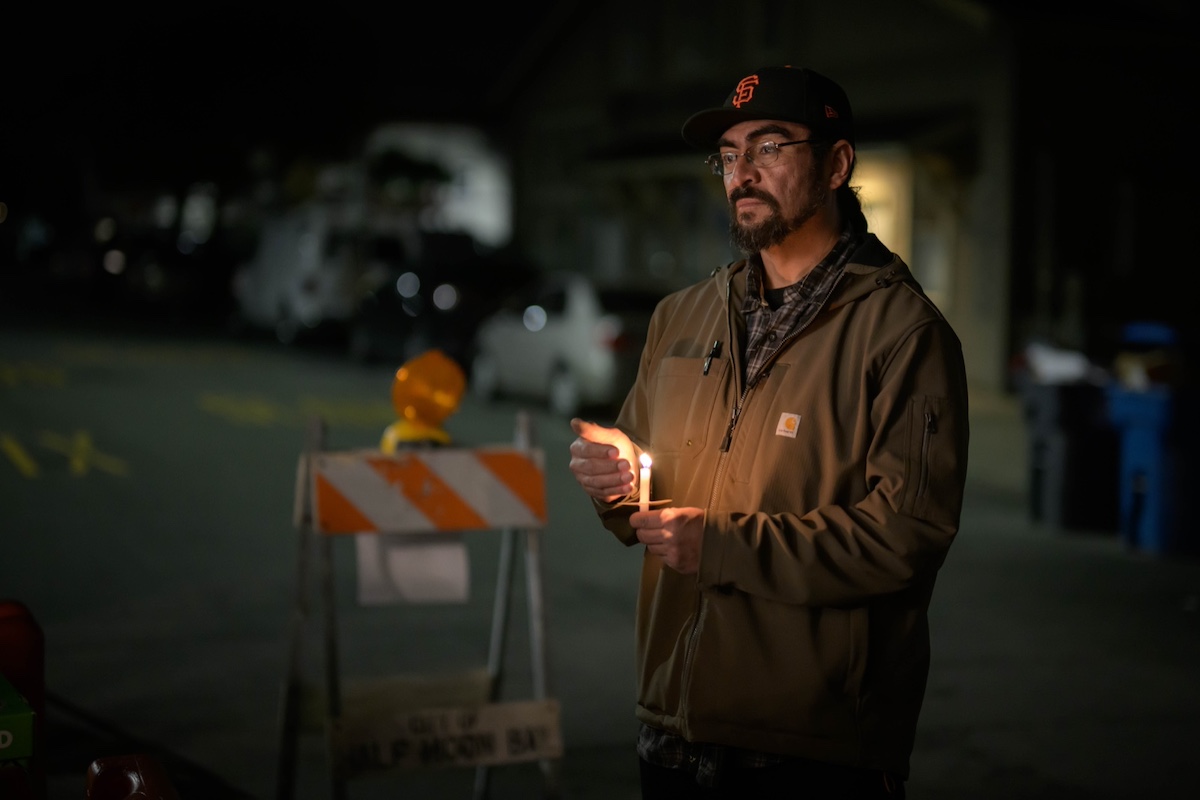By Sandra Martínez | Peninsula 360 Press
Lea en español
Above: Half Moon Bay Mayor Joaquin Jiménez during a memorial marking one year since a mass shooting claimed the lives of seven farmworkers. (Credit: Manuel Ortiz)
HALF MOON BAY, Ca. — Joaquín Jiménez is the first Latino mayor of Half Moon Bay, a small coastal enclave just 30 miles south of San Francisco. The city made headlines last year after a horrific shooting that claimed the lives of seven farmworkers.
Since becoming mayor in late 2023, Jiménez, himself the son of farmworkers, has used his position to highlight the concerns of a community that he says has for too long remained in the shadows.
“In 2014 … an 18-year-old girl was murdered. She suffered from schizophrenia and was killed by a county sheriff,” Jiménez recalled, noting that the incident became the catalyst for his future in politics.
She was the daughter of migrant farmworkers, Jiménez says, adding the shooting brought home for him the reality that the Latino community lacked any kind of voice or representation. They were invisible. “That’s when I decided that someday I was going to run for (office).”
Born in the Mexican state of Jalisco, Jiménez first came to Half Moon Bay at the age of 13 to visit his parents, then employed in the fields surrounding this bucolic region famed for its coastal vistas and small-town charm. After graduating high school, he enrolled in Chico State where he majored in Sociology, hoping to apply his studies to addressing the issues impacting Half Moon Bay’s Latino community.
In 2020, Jiménez realized that goal, winning a seat on the city council. In late 2023, council members elected him mayor for 2024, an achievement he says helped bring the immigrant community out of the shadows. “They feel more at ease,” he says.
Still, being Mexican, being an immigrant, it’s not enough, he insists, given the challenges, from a lack of affordable housing to concerns over security, health care and labor protections. Hovering over it all is an overriding fear shared by many in the community that those who come forward run the risk of losing their job and possible deportation.
Jiménez says he’s sought to bridge those fears, making it a point to listen to the stories of the region’s migrant community, which – like agricultural communities across the country – form the backbone of the local economy.
One community that remained in near total isolation was the small handful of Chinese farmworkers whose existence only came to light after the January 2023 shooting. Five of the seven victims in that attack were Chinese, as was the alleged perpetrator.
“We did know about the Chinese farmworkers” prior to the shooting, says Jiménez, noting that during the pandemic he and his staff would bring food to local farms – including the two where the shooting occurred – that had been shut down during the public health emergency. According to Jiménez, while most Latino farmworkers were under quarantine, along with the rest of the state, the Chinese farmworkers were forced to continue working through the pandemic.
He points to another case from 2021 involving farmworkers at a local hemp farm who complained of not being paid for weeks. In that case the California Labor Commission eventually shut down the farm and levied a fine on the owners amounting to tens of thousands of dollars.
An earlier case involved farmworkers being told to leave their homes overnight or face precipitous rent increases.
Both instances highlight the day-to-day injustices confronting Half Moon Bay’s farm working community, a reality Jiménez describes as a form of “modern day slavery,” with workers dependent on employers for everything from pay to housing to their physical safety.
In the wake of the January shooting, Half Moon Bay has raised some $15 million to fund construction of farmworker housing, with the first units expected to open sometime next year and reserved for victims directly impacted by the shooting and their families.
And while many in the community support these efforts, Jiménez says not everyone is on board. He recalls recent townhalls where some proposed “locking farmworkers up at night” citing safety and security concerns. “I was thinking to myself, ‘Am I laughing or am I getting angry?’ But these were some of the comments that were made.”
He added, “These are not animals to be locked up.”
With his year as mayor nearing its end, and with elections for city council around the corner, Jimenez says it’s important that the migrant community be engaged, that they participate and get informed about who the candidates are.
“Don’t go by the name. Don’t decide that because you see Joaquín Jiménez on the ballot, say, let’s vote for the Latino,” he stressed. Look at what they’ve done.
For his part, Jiménez is looking to the future. He’s established a non-profit, Rancho San Benito, which provides business and finance training to farmworkers with the goal of empowering them to literally take ownership over the fruits of their labor by one day running their own farms.
“I realized that in order to provide economic mobility to a farmer, there is no better way than to make them owners of their own harvest,” he said.





